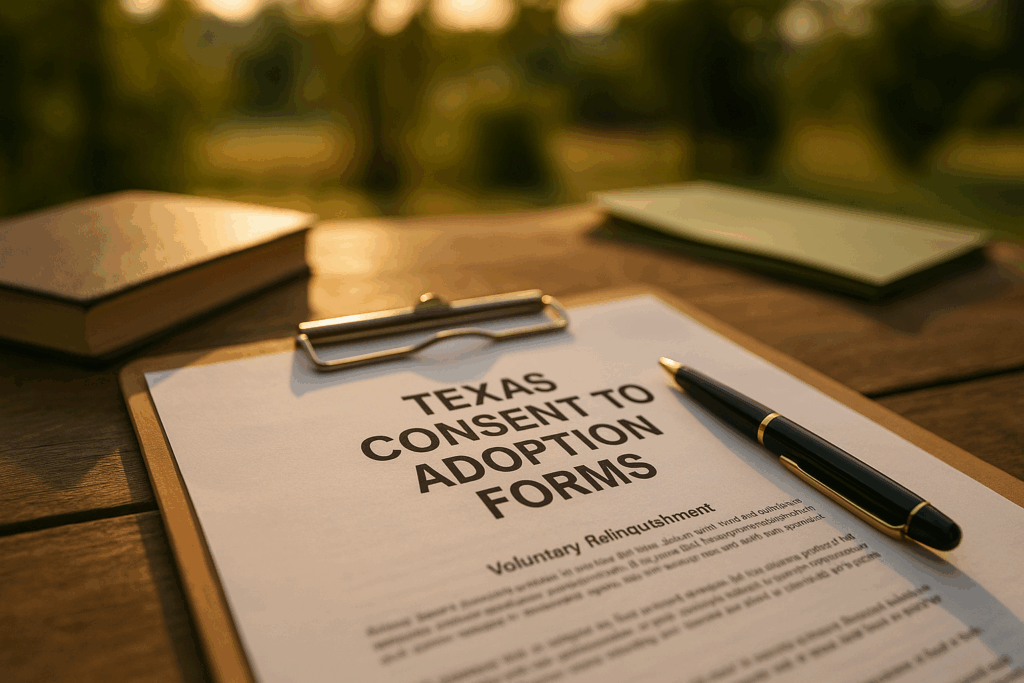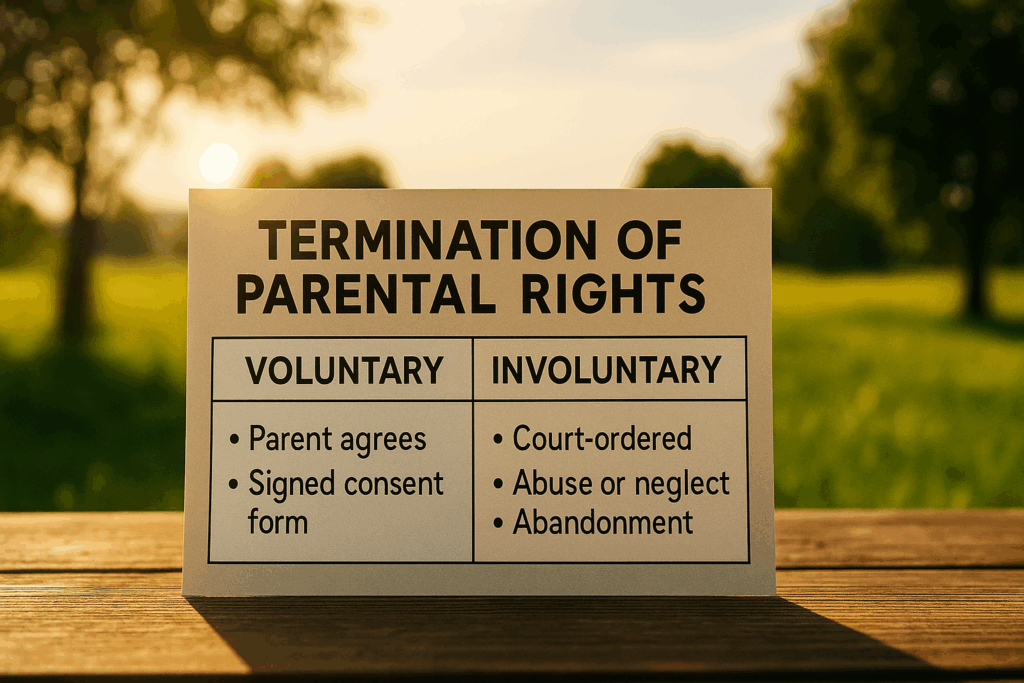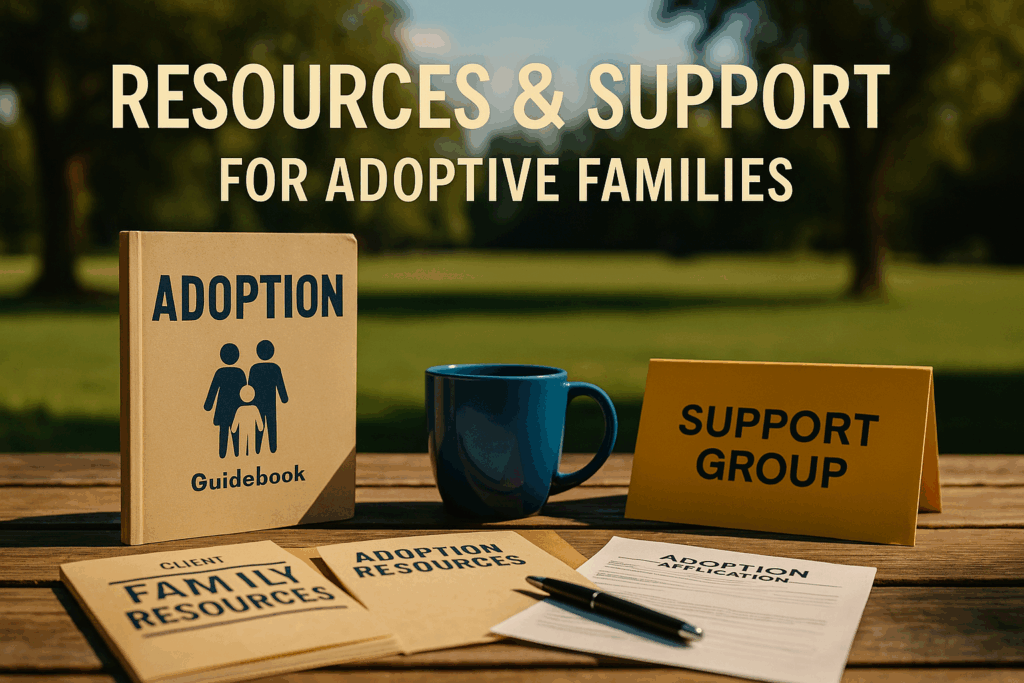
Ever feel like you’re drowning in legal paperwork and just trying to come up for air? That’s exactly how most families feel when they first hear about Texas Consent to Adoption Forms—a phrase that sounds more like a tongue twister than a key step in building a family, but it’s one of the most important documents you’ll encounter during the adoption process.
In simple terms, Texas Consent to Adoption Forms are the official paperwork that allows a biological parent to voluntarily give up their parental rights so a child can be legally adopted. It’s not just another form—it’s the legal green light that makes adoption possible. Without it, the whole process can grind to a halt.
In this post, we’ll break down everything you need to know about these forms, from who signs them and when, to what happens if someone contests the adoption or can’t be found. We’ll talk about timing, revocation, special cases like military parents and international adoptions, and why working with an experienced Texas family law attorney—like the trusted team at The Law Office of Bryan Fagan, PLLC—can save you from stressful delays or costly mistakes.
Whether you’re an adoptive parent, a birth parent, or just trying to understand what lies ahead, we’re here to help you make informed decisions that protect your future and your family. Keep reading—we promise to make it easier than decoding legalese and way more useful than guessing your way through the fine print.
Key Takeaways
- Texas Consent to Adoption Forms are essential legal documents that ensure biological parents relinquish their parental rights and facilitate the adoption process.
- In Texas, legal consent must be provided by biological parents, legal guardians, and children aged 12 and older, and any termination of parental rights requires a court order.
- Proper execution and filing of consent forms, along with legal assistance, are crucial for a smooth adoption process, helping to avoid common challenges such as missing biological parents or ambiguity in consent.
What Are Texas Consent to Adoption Forms?
Texas Consent to Adoption Forms are vital legal documents used to formally transfer parental rights from a biological parent to an adoptive one. As outlined in Texas Family Code § 162.010, these forms must be signed voluntarily and typically cannot be executed until at least 48 hours after the child’s birth, as required under § 161.103. Whether the adoption involves a stepparent, agency, or private arrangement, this step ensures the process meets the legal standards necessary for finalization.
At our firm, we often remind clients that these forms are more than just legal formalities—they’re essential safeguards. When properly completed, they confirm that the biological parent understands the permanent nature of their decision and that the adoptive family is prepared to assume full legal responsibility. This not only helps establish the legal grounds for adoption but also clears the way for the issuance of a new birth certificate naming the adoptive parents.
The emotional weight of Texas Consent to Adoption Forms is also significant. For adoptive parents, receiving a signed consent form is often the moment that transforms hope into reality. For birth parents, it marks a courageous decision made in the child’s best interest. The process, though complex, is made smoother with experienced legal guidance, especially in situations where a parent is absent, contested, or unknown.
If you’re preparing for adoption, it’s equally important to consider the financial planning involved. For insight into what to expect, visit this resource on adoption costs in Texas. You can also read our post on stepparent adoptions in Texas for further context. Our team at The Law Office of Bryan Fagan is here to support you with both compassion and clarity as you navigate this life-changing journey.

Who Must Provide Consent?
In Texas, the list of parties who must provide consent for an adoption is quite specific. First and foremost, biological parents must provide legal consent, which involves voluntarily terminating their parental rights. This legal requirement ensures that the adoption process can proceed without any future claims or disputes regarding parental rights.
Legal guardians also play a crucial role in providing consent. If a legal guardian has been granted custody of the child, their consent is equally important. This adds an additional layer of legal validation, ensuring that all responsible parties are in agreement with the adoption.
Children aged 12 years and older must also give their consent for adoption in Texas. This requirement recognizes the child’s ability to understand and participate in decisions that significantly impact their lives. It ensures that the child is comfortable and willing to become part of a new family, which is crucial for their emotional well-being.
Parental rights can only be terminated through a court order in Texas. Mere voluntary relinquishment or waiver by the parents is insufficient; a formal legal process is necessary. This step ensures that all consents are legally binding and that the adoption process can proceed smoothly.
Critical Elements of Consent
For consent to be valid in Texas, several critical elements must be met. First, the consent forms must be signed voluntarily by the biological parent. This often requires notarization to verify the authenticity of the signature and ensure that the parent is making the decision freely and without coercion.
The timing of signing these consent forms is also crucial. In Texas, biological parents must wait until the child resides at least 48 hours old before they can legally relinquish their rights. This waiting period ensures that the decision is made with sufficient consideration and emotional clarity.
Another important aspect is the possibility of revocation. In Texas, consent for adoption can be revoked within a specific timeframe before the adoption decree is finalized. This provision allows birth parents some flexibility in case they reconsider their decision, adding an extra layer of protection for all parties involved.
While witnessing or notarization of consent documents is not mandatory in Texas, it is highly recommended to ensure their validity. This additional step helps to prevent any future disputes about the authenticity of the consent, providing peace of mind for both the birth parents and the adoptive family.
Voluntary vs. Involuntary Termination of Parental Rights
Understanding the legal difference between voluntary and involuntary termination of parental rights is essential when dealing with Texas Consent to Adoption Forms. Voluntary termination occurs when a biological parent willingly relinquishes their rights, usually by signing an affidavit of relinquishment as outlined in Texas Family Code § 161.103. This affidavit can only be signed after the child is at least 48 hours old, a waiting period designed to ensure the parent’s decision is made with full awareness and free from coercion.
Involuntary termination, on the other hand, is a far more complex legal process that may be initiated without the parent’s consent. Under Texas Family Code § 161.001, a court can terminate parental rights if clear and convincing evidence shows that the parent has endangered the child, abandoned them, committed certain criminal acts, or failed to support the child. These cases often involve hearings, witness testimony, and thorough investigations. It’s a serious step that courts do not take lightly, as it permanently severs the parent-child relationship.
Situations involving an absent or uncooperative parent are especially challenging and can stall an adoption if not handled correctly. In such cases, the court may proceed with termination if the parent has demonstrated consistent neglect or an inability to safely parent. Our legal team frequently assists families in cases like these, providing strategic guidance to navigate these hurdles. For more information on this issue, we recommend reading this guide on stepchild adoption and consent challenges for further clarity.
Understanding these types of termination and their consequences is vital to protecting the future stability of an adoption. At The Law Office of Bryan Fagan, we work closely with families to ensure all legal requirements are met and rights are properly terminated before any adoption moves forward. If you’re navigating a contested adoption, be sure to explore our detailed overview of adoption and child custody rights in Texas for additional insights.

Court’s Role in Reviewing Consent
Texas courts serve as the final safeguard in the adoption process, with their primary responsibility being to protect the child’s best interests. When reviewing adoption documents—including Texas Consent to Adoption Forms—judges focus on whether the legal and emotional needs of the child are being met, in accordance with Texas Family Code § 162.016. These forms, along with any required termination of parental rights under § 161.001, must be properly executed to ensure the adoption is lawful and secure. Courts assess not only the validity of the documents but also the overall suitability of the adoptive environment.
Once an adoption is finalized in Texas, it is considered permanent and is rarely challenged or overturned. Courts apply a high legal standard when evaluating any attempt to undo a finalized adoption, placing considerable weight on the impact such a reversal would have on the child’s emotional and psychological stability. This legal permanence provides peace of mind to adoptive families and a strong foundation for the child’s future.
In some cases, even when proper consent is provided, the court may require a home study before approving the adoption. This is especially common in stepparent or private adoptions, as outlined in Texas Family Code § 162.003. The goal is to verify that the child will be placed in a safe, nurturing environment. Additionally, for children age 12 or older, their consent may be waived by the court if doing so is in their best interest. These safeguards ensure that every decision made by the court is grounded in child-centered principles.
For families pursuing a stepparent adoption, the process can feel especially personal and emotional. To better understand how courts evaluate these cases and what consent requirements apply, we encourage you to read this detailed overview of stepparent adoptions in Texas. You can also visit our blog post on adoption laws and child preferences in Texas to explore how a child’s voice may influence the outcome. With experienced legal guidance, families can confidently navigate court procedures and take the final step toward building a secure and lasting home.
Common Challenges in Obtaining Consent
Obtaining consent for adoption can be fraught with challenges. One common issue arises when a biological parent is missing, serving time in prison, or is unwilling to provide their approval. These situations can create significant obstacles in the adoption process, requiring additional legal intervention to resolve.
Incarceration of a biological parent can particularly hinder their ability to communicate consent, creating ambiguity around their parental rights. This can delay the adoption process and add an extra layer of complexity for the adoptive parents.
The absence of a biological parent can also lead to ambiguity about who has legal authority to consent, requiring further legal validation. In such cases, the court may need to step in to clarify the legal standing and ensure that the adoption can proceed smoothly.
In circumstances where birth parents cannot be located, or their rights have been legally terminated due to issues such as neglect, the court can waive the requirement for consent. This provision helps to ensure that the adoption process is not unduly delayed and that the child’s best interests are always prioritized.
How to Properly Execute and File Consent Forms
Properly executing and filing Texas Consent to Adoption Forms is a crucial step in completing any adoption in Texas. Under Texas Family Code § 162.010, written consent must be signed, dated, and—when possible—either notarized or witnessed by a judge to be legally valid. This process ensures that the biological parent’s consent is voluntary, informed, and free of any ambiguity. Missing or improperly executed forms can lead to unnecessary delays or even legal challenges that jeopardize the entire adoption.
At our firm, we emphasize the importance of early and thorough preparation. Adoptive parents should gather all necessary documentation in advance, including criminal background checks, financial disclosures, and any supporting material required for the home study. Being proactive not only demonstrates readiness and stability but also streamlines the court’s ability to review and approve the adoption efficiently.
The home study, which is required under Texas Family Code § 162.003, plays a central role in assessing the family’s environment, parenting capacity, and overall suitability to adopt. Completing this process thoroughly and honestly can help move the case forward with minimal friction. For those considering international adoption, additional legal requirements may apply, including compliance with federal immigration laws. To learn more about this, review our comprehensive guide on international adoption laws in Texas.
Being prepared for the court proceedings that follow can help alleviate stress and build confidence. Judges will closely examine the consent documentation and related materials to ensure that the child’s best interests are protected. According to the attorneys at our firm, having a well-organized case file and a clear understanding of what the court expects can lead to quicker approval and a smoother adoption experience. For additional preparation tips, check out our adoption checklist for Texas families, which outlines every stage of the process.

Importance of Legal Assistance
Navigating adoption law in Texas involves more than paperwork—it requires a deep understanding of legal procedures, timelines, and statutory requirements. One of the most important components is ensuring that Texas Consent to Adoption Forms are executed and filed in strict compliance with state law, particularly under Texas Family Code §§ 161.103 and 162.010. Engaging an experienced family law attorney can make all the difference when it comes to managing these legal steps effectively and avoiding costly delays or errors.
At The Law Office of Bryan Fagan, our attorneys provide tailored legal guidance for each family’s unique situation, whether it involves a stepparent adoption, agency placement, or a contested case. We work to ensure that every form is completed correctly and submitted on time, that termination of parental rights is handled lawfully, and that the process aligns with court expectations. This proactive legal approach reduces the chances of challenges that might derail or prolong the adoption.
Experienced legal counsel can also speed up the acquisition of essential documents—like background checks, home study approvals, or affidavits of relinquishment—helping families stay ahead of deadlines. More importantly, when adoption cases are presented to a judge, the focus shifts to what’s best for the child. Our attorneys are skilled in building a legal narrative that highlights emotional stability, continuity of care, and a supportive home environment, all of which courts value highly in adoption decisions.
If you’re considering a stepparent adoption or want to understand how consent affects the process, we encourage you to explore this practical guide to stepparent adoptions in Texas. For even more insight into the role of family law in these proceedings, visit our related article on what Texas judges look for in adoption cases. With the right legal partner by your side, you can move forward with confidence and clarity, knowing that your adoption is built on a strong legal foundation.
Real-Life Examples and Testimonials
Real-life stories from Texas families illustrate just how important careful preparation is when completing Texas Consent to Adoption Forms. According to Texas Family Code § 162.010, properly executed consent forms are not only required—they’re foundational to moving an adoption forward. Families who took the time to organize their documents, confirm their compliance with legal standards, and work closely with their attorneys reported significantly faster court approvals and far fewer delays.
As our family law team often advises, organization doesn’t just check legal boxes—it reduces anxiety during what is often an emotionally overwhelming process. Clients who entered district court proceedings with all their materials in order—including the signed Texas Consent to Adoption Forms—felt more confident and in control. Having a clear plan and working with legal professionals who know the system can streamline the experience, keep costs down, and minimize last-minute surprises.
In one recent case, a couple adopting their niece shared how diligently following a checklist and consulting their attorney led to a same-day approval by the judge. Their preparation, guided by legal counsel, allowed them to avoid common pitfalls and meet every requirement outlined in Texas Family Code Chapter 162. Their journey highlights how the right support can turn a stressful process into a joyful, life-changing milestone.
These testimonials echo a core message we emphasize at The Law Office of Bryan Fagan: knowledge and preparation are empowering. For more insight into how the legal process intersects with your family goals, we recommend reading our guide on finalizing adoptions in Texas. With the right legal strategy and compassionate support, your adoption journey can be just as rewarding as the stories that inspire it.

Additional Resources and Support
Navigating the adoption process in Texas can feel overwhelming, but families don’t have to do it alone. In addition to completing essential legal steps like filing Texas Consent to Adoption Forms, families can turn to trusted support systems such as the Texas Adoption Resource Exchange (TARE), located at 4900 North Lamar Blvd in Austin. TARE offers invaluable tools for families exploring adoption or foster care, including regional contacts, child profiles, and opportunities to volunteer or donate in support of children needing permanent homes.
Local and regional resources play a major role in addressing the unique emotional and legal challenges that come with adoption. Whether you’re seeking help with the termination of parental rights, assistance in completing your home study, or guidance on court expectations, community-based support services can offer tailored insight and peace of mind. As outlined in Texas Family Code Chapter 162, the legal process involves multiple parties and steps, making reliable information and compassionate advocacy essential.
Programs that promote community engagement—such as foster family support groups or mentorship networks—help prospective adoptive parents better understand the realities of foster care and adoption in Texas. These initiatives not only provide children with critical support, but also help families prepare for the transition by connecting them to experienced caregivers and professionals. For more on the legal framework surrounding the termination of parental rights, visit this detailed guide to the process in Texas.
At The Law Office of Bryan Fagan, our team works closely with families to ensure they are informed, supported, and legally protected throughout their journey. To dive deeper into the legal side of adoption, including what judges look for when reviewing Texas Consent to Adoption Forms, we recommend exploring our post on how to prepare for adoption hearings in Texas. With the right resources and legal guidance, families can move forward with confidence and clarity, knowing they are giving a child the stability and love they deserve.

Conclusion:
Adoption is one of the most meaningful and life-changing journeys a family can take—but no one said the paperwork would be the easy part. Understanding and correctly handling Texas Consent to Adoption Forms is more than just checking a box—it’s about laying a solid foundation for your future family, free of avoidable legal snags and full of peace of mind.
If you’re feeling overwhelmed, take a deep breath. You don’t have to go it alone. At The Law Office of Bryan Fagan, PLLC, we’ve walked this road with countless families across Texas, helping them navigate every signature, deadline, and courtroom moment with confidence. We’re not just here to explain the law—we’re here to protect what matters most: your family’s future.
So whether you’re just starting the adoption process or knee-deep in forms that feel like a foreign language, now’s a great time to reach out. Let’s make sure everything is done right the first time—because this isn’t just about paperwork. It’s about building the life you’ve been dreaming of.
And if you’re still wondering whether all the effort is worth it, just imagine the day you get to say, “Welcome home” to your child. That moment? It starts with the right legal support. Let’s get you there.
Frequently Asked Questions About Texas Adoption
You can get adoption papers in Texas through the district court clerk’s office in your county, or by working with a Texas family law attorney who can ensure the forms are correctly prepared and filed. Some standard forms may also be available on the Texas Law Help website.
In most cases, your husband cannot adopt your child without the biological father’s consent unless the father’s parental rights have been legally terminated. However, if the father is absent, unknown, or has abandoned the child, the court may allow the adoption to proceed without his consent.
To file a petition for adoption in Texas, you must submit the appropriate legal forms to the district court in the county where you or the child lives. This includes consent forms, termination of parental rights documents, and a completed adoption petition. A home study and background checks are also typically required.
Adoptive parents in Texas must be at least 21 years old, financially stable, and able to provide a safe and loving home. They must complete a background check, home study, and attend training if adopting through the foster care system. Consent and termination of parental rights must be finalized before adoption.
Yes, you can access some basic adoption forms online through the Texas Law Help website or your county’s court website. However, adoption cases often involve complex legal steps, so it’s best to consult with a qualified family law attorney to ensure your documents are accurate and complete.
Adoption costs in Texas vary widely depending on the type. Private adoptions may cost $5,000–$50,000, while adopting through the state foster care system can be free or low-cost. Legal fees, home studies, and court costs are typically part of the overall expense.
In Texas, your stepdad can only adopt you without your biological father’s permission if the court has terminated your father’s parental rights. This usually requires showing that the father is absent, unfit, or has failed to support or maintain contact with the child.
Once an adoption is finalized in Texas, the biological parent’s rights are permanently terminated. They cannot regain custody unless the adoption is legally overturned, which is extremely rare and typically only occurs in cases of fraud or procedural error.
The cost to terminate parental rights in Texas varies depending on whether the case is contested. Uncontested terminations may cost between $1,500–$3,500, while contested cases with court hearings and legal battles can cost significantly more. It’s highly recommended to work with an experienced attorney.
Bryan Fagan is a Texas family law attorney with a heart for adoption—inspired not just by his legal career, but by his own family story. Growing up in Atascocita with two adopted brothers, Bryan learned early the profound meaning of chosen family. His passion for justice was sparked by John Grisham’s The Pelican Brief, and he became the first lawyer in his family, balancing night classes at South Texas College of Law while caring for his grandmother with Alzheimer’s.
Today, Bryan brings that same dedication to his practice, guiding families through adoptions, custody disputes, divorces, and complex marital agreements. A certified member of the College of the State Bar of Texas, he combines elite legal expertise with genuine empathy—drawing from his roles as a husband, father of three, and advocate for families facing false CPS allegations.
Based in Houston, Bryan is actively involved in the Houston Bar Association’s Family Law Sector and statewide family law organizations. Whether finalizing an adoption or protecting parental rights, he believes the law should reflect the deepest values of home, commitment, and love.

